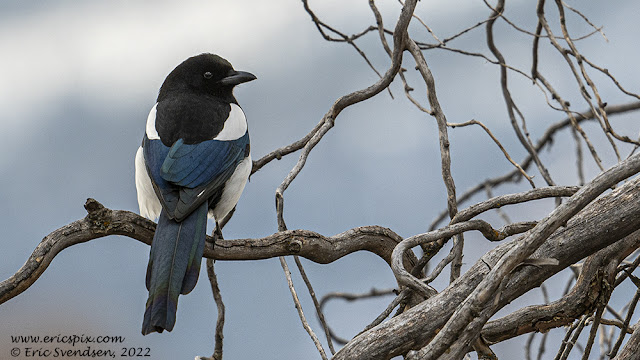Black-billed magpie and composition.
I find there are at least two parts of me that wrestle with each other every time I get behind a camera. First, there is the creative side that wants the photo to look good; applying compositional axioms that have been tried and tested over the years. This would include things like framing, rule of thirds, pointing with lines, and so on. This usually means that I am searching for a meaningful frame of reference while assessing light and what position to photograph from. This often requires time and forethought; something that many of my subjects cares very little about.
Then there is the scientist part of me that wants to record an image reflecting some aspect of an organism's life history, appearance, and environment. The photo should convey information about the nature of the subject. Often it involves simply about what it looks like and capturing fine details about its morphology. It is always nice to incorporate behaviours into the shot. This would include actions related to breeding, foraging, and interaction with other members of their ecosystem. Photographing such moments helps me appreciate the beauty and fragility of the world in which we live. Recording such moments requires that I pay special attention, often involving some duration, to an individual or population that generates problems of its own.
The Hawthorne Effect, also called the Observer Effect, is the situation in which the behaviour of the subject is affected by the presence of the observer. In other words, you can't photograph a living thing without altering its behaviour. I would say this is often true, especially in situations where proximity plays a role. However, I find that habituation can mitigate those circumstances. This is one of the reasons I like shooting in parks. Lots of interesting creatures with a certain lack of interest in the presence of people. It means that organisms will more likely ignore my presence. A good long lens helps too as it means I can be further away and still get some decent images.
As with anything, time and patience pay off. I often have to be happy with obtaining a fleeting image but occasionally am rewarded with a carefree individual that allows me to capture photos where I can achieve both goals without incurring the Hawthorne Effect. I do not have time to habituate creatures to my presence, especially if a blind is required, and lack the confidence to venture into the backcountry like Grizzly Adams to become one with the environment. I guess I am what could be called a fair-weather photographer that is satisfied with capturing images in convenient locations without offering my body or schedule as a sacrifice or trade.
Looking back, I think that I have captured some pretty decent shots. Not reward-winning, but rewarding, and I am all right with that.
Thanks for reading. www.ericspix.com




Comments
Post a Comment